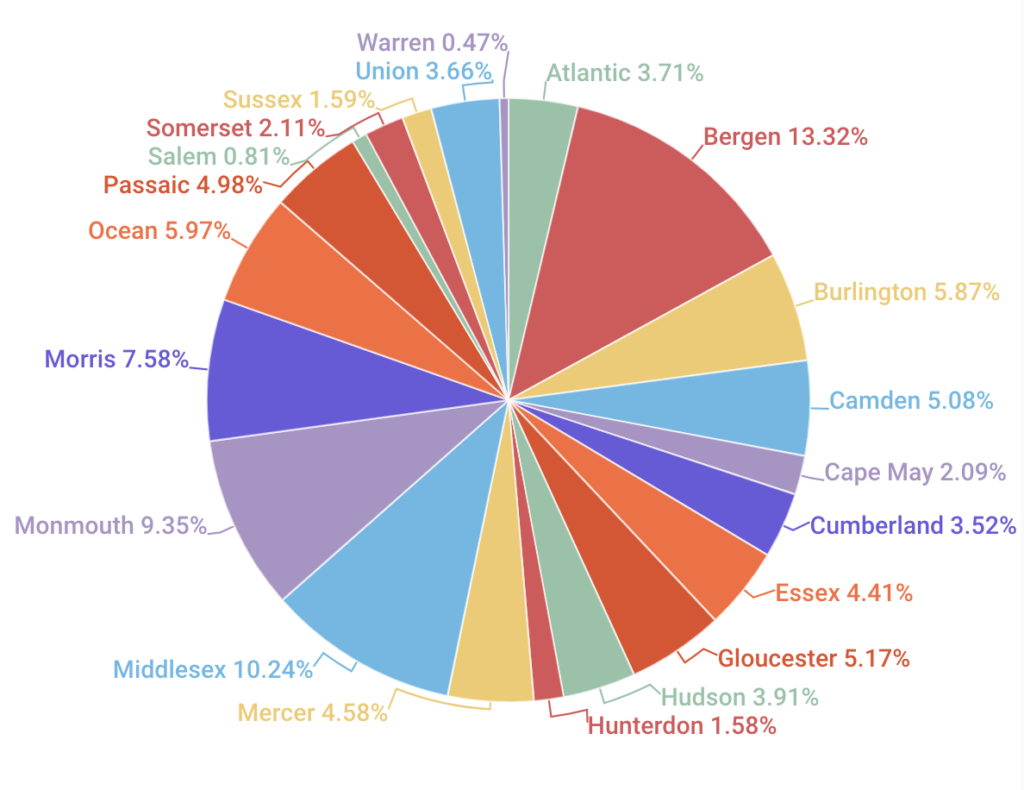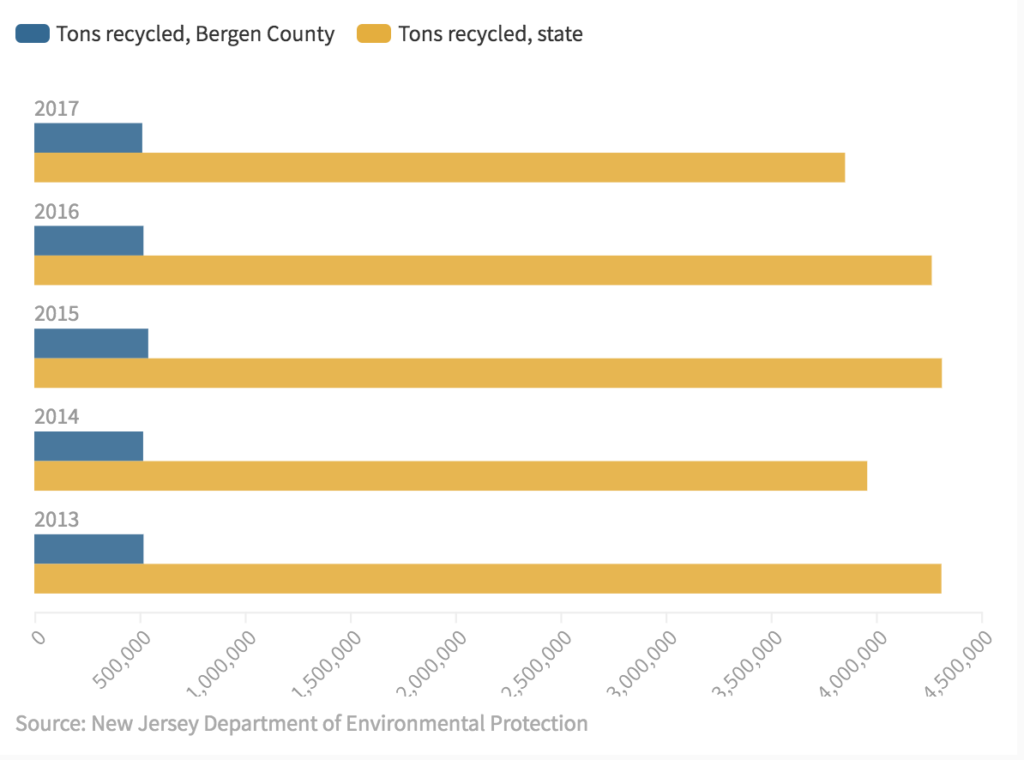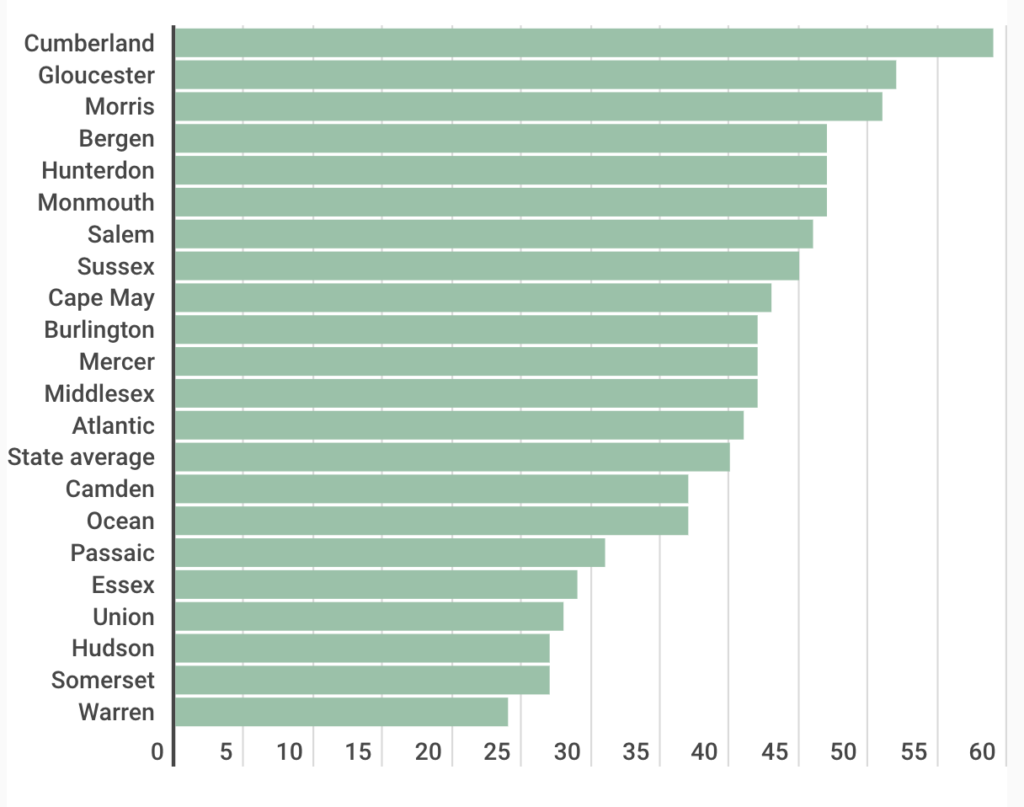Because of its recycling performance in 2017, Bergen County has received $1.7 million in recycling grants from the state, more than any other county in New Jersey.
Money from the state’s Recycling Enhancement Act, which includes a $3-per-ton surcharge on trash disposed at solid waste facilities, funds the grants. This year’s allocations are based on recycling performance in 2017. The state Department of Environmental Protection awarded $14.3 million overall in recycling grants to municipal and county governments.
“Recycling remains an important way for residents to help protect the environment,” Commissioner Catherine McCabe said in a statement. “These grants will fund efforts that have become even more important as we look for ways to address changes and challenges in recycling markets that are occurring across the nation.”
In Bergen County, Paramus received the largest grant, at nearly $145,000. Fair Lawn followed, collecting more than $135,000.
The Bergen County towns that had recycled the largest proportion of their municipal solid waste in 2017 were Old Tappan (92%), Washington (92%), Harrington Park (90%), Demarest (86%) and Alpine (81%). Those with the lowest percentage of recycling were Fairview (7%), Hackensack (15%), North Arlington (15%), Wood-Ridge (16%) and Palisades Park (19%). Paramus generated the most recycled material by ton, with more than 43,000.
The Passaic County towns that recycled the largest percentage of their municipal solid waste in 2017 were Passaic (79%) and Ringwood (67%). The weakest recycling towns were Woodland Park (4%) and Prospect Park (17%). Paterson generated the most recycled material by ton, with nearly 44,000.

“We expect that these grants will further ongoing recycling efforts in our communities and educate the public about the importance of proper recycling,” said Mark Pedersen, the DEP’s assistant commissioner for site remediation and waste management.
New Jersey is among the few states that mandate recycling, although collection programs across the state vary.
About 40 percent of municipal solid waste — 3.85 million tons — was recycled in 2017, a slight drop from 2016. The slump is due to source reduction, according to the DEP. Manufacturers, for example, are making plastic bottles thinner and lighter, cutting down on recyclable material from the start.
Bergen County’s recycling rate — 47 percent — is well above the state average.

Not reflected in the figures is a rising challenge: China, once the world’s largest importer of recyclables, stopped buying most of them in January 2017, restricting its plastic scrap purchases to materials 99.5 percent or more pure — and leaving the global recycling industry in turmoil.
A year later, China banned 24 more materials from import, including post-consumer plastic and mixed paper, according to the National Waste and Recycling Association.
Even before the 2017 ban, stringent requirements were risky for Bergen County. Most North Jersey recyclables, especially paper, are sent abroad — mostly to China. Some municipalities make between $300,000 and $500,000 annually from recycled materials sales.

Many towns, especially those in Bergen County, try to entice more residents to recycle by embracing simpler single-stream recycling programs. Residents can combine paper, cardboard, glass, aluminum and plastic in one container rather than separating them.
Some experts say single-stream recycling increases the amount of material collected by up to 30 percent and provides more revenue to the towns that sell their recyclables. But given China’s crackdown, some in the industry question the wisdom of having moved to a single-stream system. They say that so much garbage gets mixed in with the recyclables that it significantly reduces its value.
The shift by China has forced single-stream recycling system users, including some municipalities, to rethink tactics.
The state grants are intended to help by funding recycling receptacles and drop-off centers along with education about best recycling practices, according to the DEP.
But they’re not the state’s only effort to aid local-level recycling programs. A DEP social media campaign called Recycle Right NJ provides a host of ways to keep recycled materials from becoming contaminated, and its RecycleCoach app offers free access to municipal recycling program information.
Some municipal leaders have taken contamination prevention into their own hands: Students at a Leonia elementary school are learning to separate trash, recycling and food waste.
That separation — dual-stream recycling — adds a step to the process for consumers but could improve the amount of material kept out of landfills.
The DEP has also pledged $1 million in grants for state colleges and universities to conduct recycling research.
Alexis Shanes is a local reporter for NorthJersey.com. For unlimited access to the most important news from your local community, please subscribe or activate your digital account today.
Email: shanesa@northjersey.com Twitter: @alexisjshanes
This story was produced in collaboration with the New Jersey Sustainability Reporting Hub project. It was originally reported by Alexis Shanes for northjersey.com, and may be re-distributed through the Creative Commons License, with attribution.
